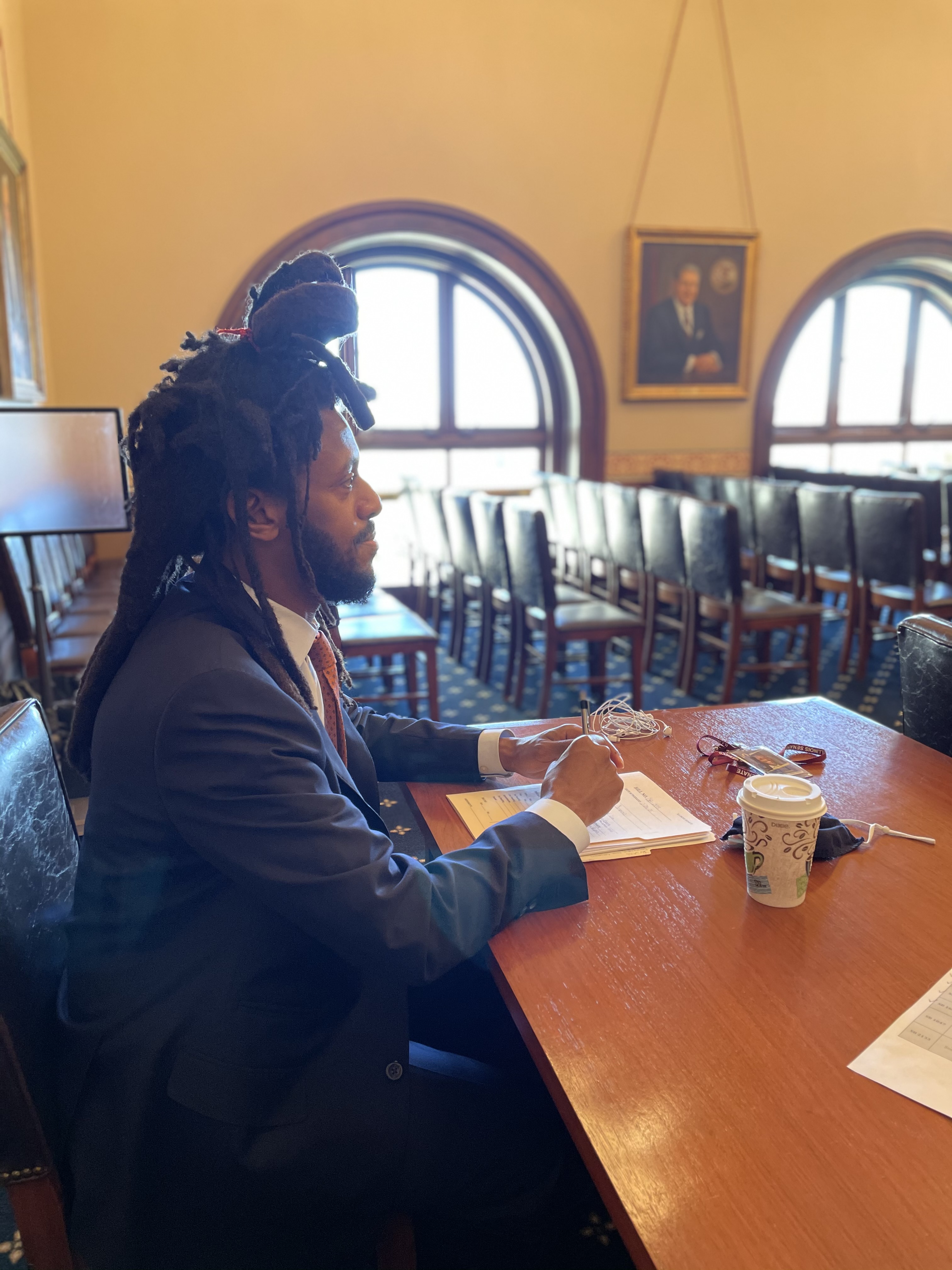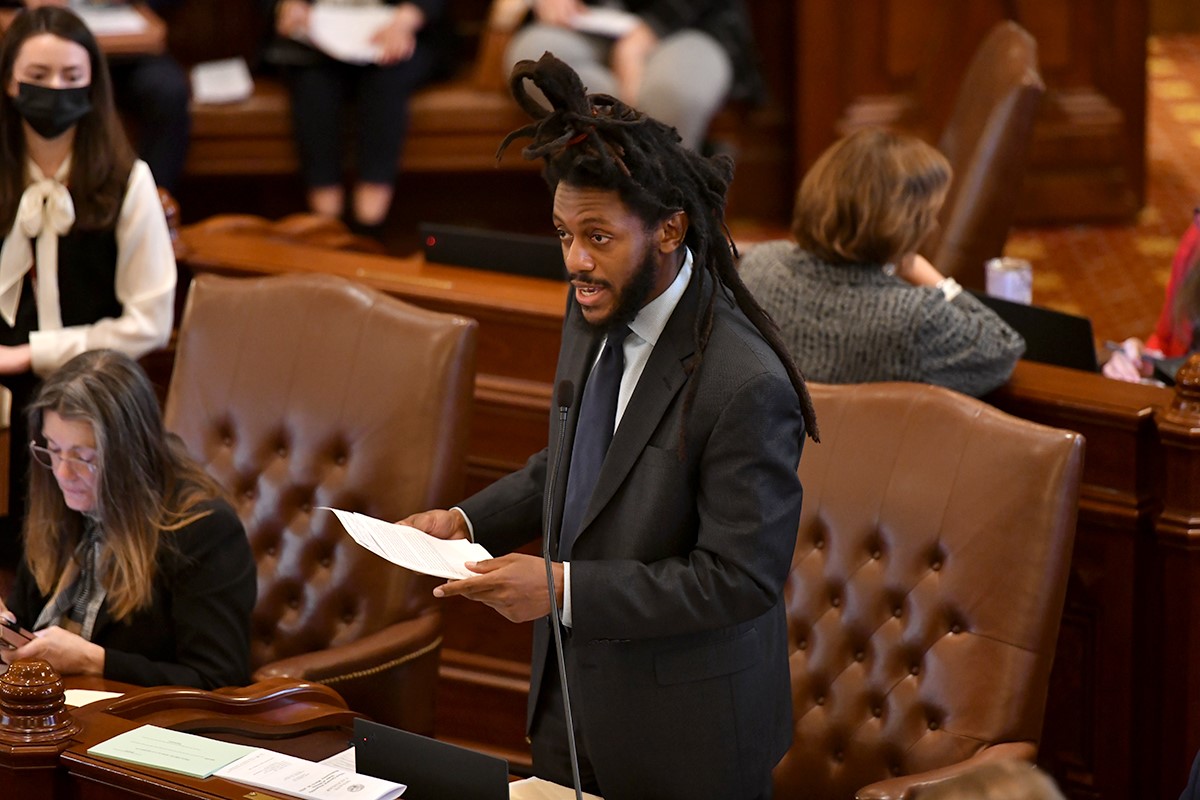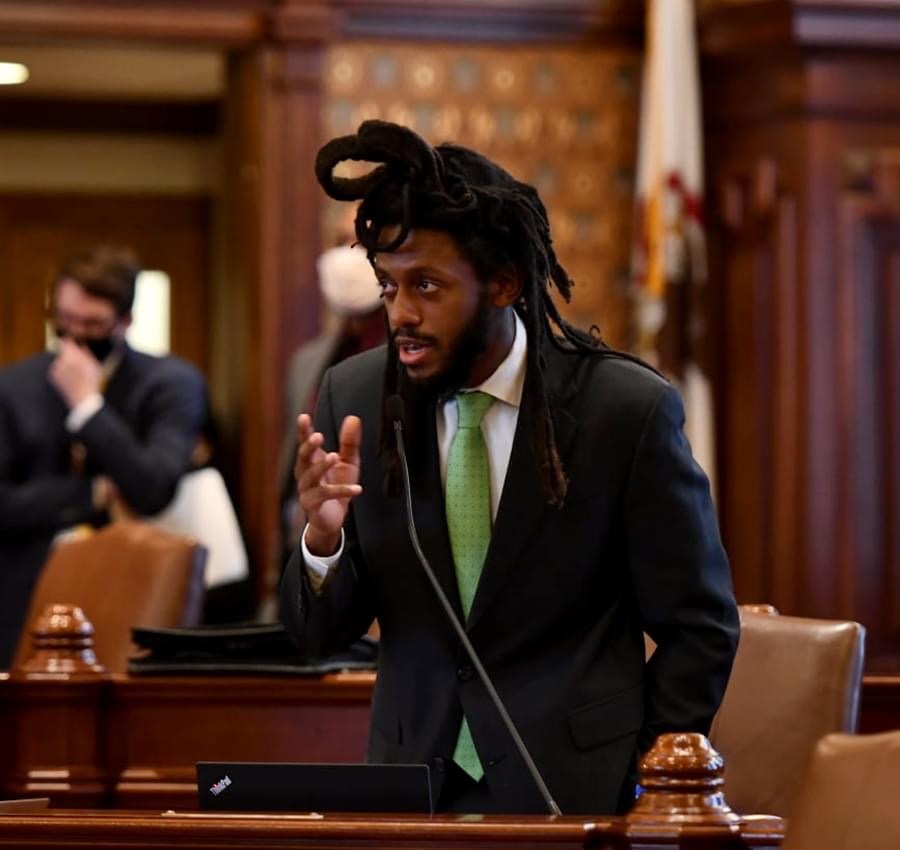- Details
- Category: Press Releases
SPRINGFIELD – State Senator Mike Simmons has been named Chair of the Senate Committee on Human Rights in the 103rd General Assembly.

The Senate Committee on Human Rights will take on key issues such as immigration, LGBTQIA+ rights and policies related to race, among other key issues.
Simmons is a strong advocate for expanding the rights of those who have been treated unjustly by the government. In the 102nd General Assembly, he sponsored the Jett Hawkins Act and the CROWN Act, which prevent schools and workplaces from prohibiting hairstyles historically associated with race, ethnicity, or hair texture. He also sponsored SB3865, which removes the word “alien” from all Illinois state statutes, programs, etc., in reference to noncitizens and undocumented immigrants. One of his first bills was passage of SB2133, a systemic step forward that requires state agencies and departments to begin collecting and assembling data for sexual orientation and gender identity for Illinois populations. Prior to joining the Senate, Simmons consistently fought to advance human rights. At the Obama Foundation, he pushed to ensure queer voices were reflected in youth-serving violence prevention programs, prior to that he led negotiations to secure protections for transgender residents in Chicago, and most recently fought tirelessly to ensure protections for gender-affirming care and parents of transgender youth were incorporated into the Patient and Provider Protection Act, groundbreaking legislation signed into law last month that advances sweeping protections for reproductive health care and ensures Illinois remains a refuge for bodily autonomy.
As committee chair, Simmons aims to expand protections for all in Illinois. This is Senator Simmons’ first committee chairpersonship.
Simmons also has been named Vice-Chair of the Senate Behavioral and Mental Health Committee. Expanding access to mental health is a top priority for Simmons. In his first term he passed SB4028, which requires schools to instruct on how and where to access mental health care while ensuring diverse youth voices have a seat at the table in shaping mental health policy at the state level.
Simmons previously served as the Vice-Chair of the Senate Healthcare Access and Availability Committee and served on the Senate Behavioral and Mental Health Committee, Tourism and Hospitality Committee, Appropriations Subcommittee on Health, and Transportation Committee.
Senator Simmons’ new committee assignments for the 103rd General Assembly are as follows:
- Behavioral and Mental Health (Vice-Chair)
- Education Committee
- Transportation Committee
- Appropriations – Health and Human Services Committee
- Details
- Category: Press Releases
CHICAGO – To celebrate the Lunar New Year, State Senator Mike Simmons (D-Chicago) is inviting community members to join him at the 2023 Argyle Lunar New Year Parade.
Celebrate the year of the rabbit on Saturday, Jan. 28 from 12 p.m. - 4 p.m. at the corner of West Argyle Street and North Winthrop Avenue, hosted by Uptown United, 48th Ward Alderman Harry Osterman, and over 20+ local community groups.
The event has happened for more than forty years and the day will feature cultural institutions, dancers and performers, family friendly activities and a parade that will begin at 1 p.m. on the corner of West Argyle Street and North Winthrop Avenue.
“I am honored to participate in the Argyle Lunar New Year Parade again, and usher in a year of hope and prosperity with our diverse AAPI community,” said Simmons. “Coming together as a community is a gift that I don’t take for granted, and I hope everyone will join me.”
The parade will kick-off at Argyle and Winthrop. The parade route will head west on Argyle, north on Broadway, east on Winona, and south on Sheridan and then back to Argyle. Due to CTA construction, the parade will not head into Ainslie, as it has in years prior.
For more information, visit exploreuptown.org/lunar.
- Details
- Category: Press Releases
 SPRINGFIELD – State Senator Mike Simmons Chief-Cosponsored legislation that allows employees to take up to 40 hours of paid leave.
SPRINGFIELD – State Senator Mike Simmons Chief-Cosponsored legislation that allows employees to take up to 40 hours of paid leave.
“Life is unpredictable, from a car accident to a child home with a fever to caring for an elderly parent, things happen that will take priority over work,” said Simmons (D-Chicago). “It is important all employees in Illinois, especially working single-parents and those with families, have the time they need to handle what is happening at home without worrying about missing a paycheck.”
Senate Bill 208 creates the Paid Leave for Workers Act, which provides employees in Illinois with a minimum of 40 hours of paid leave which can be used for any reason within a 12-month period. Senator Simmons was proud to be a Chief-Cosponsor of the legislation.
The measure corresponds with another proposal Senator Simmons sponsored in the 102nd General Assembly, the Single Parents’ Bill of Rights. That bill would allow employees who are single parents to claim up to 40 hours of unpaid time off of work to care for their child’s needs. With the passage of SB 208, all employees, including single parents, will now have 40 hours of paid time off.
“Parenting is one of the toughest jobs you can have. Nearly one out of three households in my district are headed by single parents,” Simmons said. “In my People’s Legislative Council initiative, single moms from our district told me that they often struggle to get time away from work to attend their kid’s parent teacher conferences, attend sporting events, or get a sick child to the doctor. It’s my duty to fight for legislation that will aid single parents in the balancing act of raising their children, showing up for work, and taking care of themselves as hardworking parents who are so underappreciated. The Paid Leave for Workers Act will help them achieve that balance.”
SB 208 passed out of the Senate on Tuesday and now heads to the Governor’s desk for consideration.
- Details
- Category: Press Releases
 SPRINGFIELD – State Senator Mike Simmons has been sworn into the 103rd General Assembly. Simmons’ inauguration marks the start of his second full term in the Senate. Senator Simmons is a lifelong resident of the 7th Illinois Senate District, the first Black person to serve the 7th District, the first openly gay member of the Illinois Senate, the first Ethiopian-American to serve in either chamber, and the third openly gay, black state senator in the nation. In his first term, he secured passage of 16 pieces of legislation and helped shape dozens more including banning hair discrimination in Illinois schools, improving access to mental health for diverse youth, providing economic relief for struggling parents, requiring lead abatement in buildings, and expanding protections and healthcare for LGBTQ+ people in Illinois to name a few.
SPRINGFIELD – State Senator Mike Simmons has been sworn into the 103rd General Assembly. Simmons’ inauguration marks the start of his second full term in the Senate. Senator Simmons is a lifelong resident of the 7th Illinois Senate District, the first Black person to serve the 7th District, the first openly gay member of the Illinois Senate, the first Ethiopian-American to serve in either chamber, and the third openly gay, black state senator in the nation. In his first term, he secured passage of 16 pieces of legislation and helped shape dozens more including banning hair discrimination in Illinois schools, improving access to mental health for diverse youth, providing economic relief for struggling parents, requiring lead abatement in buildings, and expanding protections and healthcare for LGBTQ+ people in Illinois to name a few.
“It’s a towering honor to continue serving the people of the 7th district in the 103rd General Assembly. The district, which includes the far north side Chicago, is one of the most diverse in the nation with well over 100 languages spoken and ethnicities represented from every corner of the world. I look forward to centering the voices, lived experiences, and needs of these diverse communities and every single one of my constituents in my office. In my first term we put the people of the 7th district at the center of all my legislative work — single moms, longtime residents, youth, LGBTQ+ people, returning citizens, the disabled, survivors of gun violence, seniors, and so many others who have been unheard for too long.”
“In my new term I will continue to focus on introducing and passing far-reaching policy that makes a difference for everyday people, delivering excellent and proactive constituent services, and making sure 7th district residents feel seen, heard, understood, and helped by my office. I will also continue to fight for legislation that provides affordable housing to those who need it, expands access to health care, expands the rights of our LGBTQ+ communities, improves our transportation systems, protects our diverse immigrant communities, protects reproductive rights, supports our schools, addresses gun violence, and so much more.”
Simmons was first sworn in to the Senate in 2021, after previously serving as Founder and CEO of Blue Sky Strategies & Co., a firm that develops anti-racist public policy. He also previously served as Deputy Commissioner of the Department of Planning and Development for the City of Chicago and was Deputy Director of the My Brother's Keeper Alliance, a national Obama Foundation initiative. Prior to that he served on the legislative staff of US Senator Dick Durbin.
Simmons looks forward to working hard, leading on progressive issues, collaborating with his colleagues, and being an outspoken voice for the people of his district in the 103rd General Assembly.
More Articles …
Page 41 of 63






